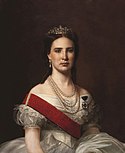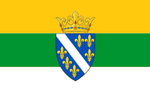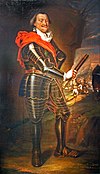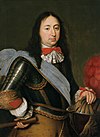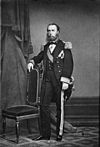Stradia
Kingdoms and lands represented in the Imperial grand council under the Crown of Stradia | |
|---|---|
| Motto: We are only as strong as we are united, as weak as we are divided. | |
| Anthem: In unity we stand | |
| Imperial standard 150px | |
| Capital and largest city | - |
| Demonym(s) | Stradian |
| Government | Federal parliamentary constitutional monarchy |
• Holy Empress | Maria Carolina V of Brazza |
• Chief of the Imperial grand council | Charles Hoffman |
| Legislature | Imperial grand council |
| Population | |
• Estimate | 68,215,948 |
• 2021 census | 68,000,000 |
| GDP (nominal) | estimate |
• Total | |
• Per capita | |
| Currency | Vateri (-) |
| Date format | dd ˘ mm ˘ yyyy |
| Driving side | rHT |
| Calling code | +06 |
| Internet TLD | .st |
ㅤPreceded byㅤ ㅤPart ofㅤ Stradia's existence as a sovereign entity:[1]
← ← Pact of Morave (1921) Vatarian Confederation (1974) Latusian Union(1987) | |
Stradia, often referred to as the Stradian federation is a country located in the centre of the continent of Latusa. Bordering Dratova and Troslav. It consists out of 14 Federal states that have their own parliament. Currently, the Stradian population embodies approximately 68 million citizens. The country was formed after the unification of many states under the house of Brazza as the Stradian Empire. As a result, the Stradian Federation is a multi-ethnic state united under one government and monarchy. Stradia is also a member of the Vatarian Confederation and the Latusian Union.
Etymology
The name Stradia derives from a combination of the two words Stra and ia. Stra being the biggest and most important river in the nation, and ia bears the meaning of land of. The letter d was added so the name could be better pronouced.
The name as a whole means: Land of the river Stra.
History
Early history
Middle Ages
16th century
17th century
18th century
19th century
The Bartovian independence war was a short war fought between Bartova and Stradia. The war started in the summer of 1821 and lasted until the spring of 1822. In the Winter of 1821, Troslav joined the war on the side of Stradia. The war was won by Stradia with the result being that Bartova rejoined the nation of Stradia.
The year of 1832 is one of the most important years in Stradian history for it is the year when the nation got its first constitution. This constitution was drafted by Holy Empress Maria Carolina IV who gifted her powers away to a a democratically elected parliament. This was a radical change and many people were upset with it, most notably, the nobles and monarchists. Though on the other hand, her decision was supported and praised by many others, liberals all across the continent praised Maria Carolina for her daring act.
Sadly enough, Maria Carolina wouldn't see how her democratic nation would rise into a hub of liberalism and socialism. She died at the end of a revolver during the Revolutions of 1834, assassinated by a pro monarchist.
The second wave of colonial expansion for Stradia began in 1839 with the founding of the port of Sophiaburg in the present day country of Ashata. This port grew out into the vast colony of Johannesland. Johannesland was the biggest and truly only exploit colony that Stradia ever possessed. The region was rich in iron, coal, coffee and cotton and exported these products back to the Stradian home country.
In 1869 the Empire of Machacia was split from Stradia as their last shared monarch died. Joseph V of Stradia and I of Machacia died in 1869 and for having no surviving children of his own both nations choose a new monarch to lead their state. The nations already were separate from everything except the military, foreign policy and their monarchy, but that thus too came to an end. The new Holy Emperor of Stradia became Joseph VI, a nephew of Joseph V/I. The new Empress of Machacia became Antonia I, a cousin of Joseph V/I.
In 1878 the Ashata independence war started. Ashata was the biggest colonial possession Stradia controlled. The war ended in 1881 with a thunderous loss for stradia as from then on Ashata would be an independent nation.
The independence led to the military taking control in Ashata and an ethnic purge. Most of the groups who were targeted fled the country and immigrated to other nations, in particular Stradia, as they saw it as the nation that protected them before the independence of Ashata.
20th century
In the 20th century, Stradia was embroiled in the Great War. Stradia fought together with her allies, those being the members of the Imperial Coalition, Dratova and Troslav. During the Great war times became hard inside Stradia with it almost concluding to the collapse of the federation. Though this never happened, for their allies saved them and eventually won the war.
At the end of the Great War the nations of Stradia and Suleim signed a treaty in which they would share the border lands known as Katovska. This treaty is known as the Pact of Morave.
Contemporary era
In 1974, Stradia together with Dratova created the Vatarian Confederation. It's goal being to tie the two nations together and have them both profit from it. The confederation unites the two nations in their economy, military and international politics.
In 1987, Stradia formed together with other nations the Latusian Union, the current members of the union are Stradia, Dratova and Troslav.
Geography
Climate
Government and Politics
Even though Stradia is an independent nation, not all things are decided by the central government. The government of the Vatarian Confederation decides on the nation's military and foreign policy.
Foreign Relations
Stradia's official foreign policy is
| Country/Union/Autonomous District | Status (Scale 1-10) |
Notes on relations | Mutual Embassies | Canonity |
|---|---|---|---|---|
| 5 | Country is the closest ally of Stradia and is seen as a brother nation, trusted no matter what | Yes | Canon | |
| 5 | Country is considered as a close Stradian ally | Yes | Canon | |
| 4 | Yes | Canon | ||
| 2 | Country is disliked by the general Stradian populace for the dictatorship which is in power | Yes | Canon | |
| 4 | Country was a historical enemy of Stradia but is currently conciered a stradian ally | Yes | Canon | |
| File:Abut Abut | wip | wip | Canon | |
| File:Hilaz Hilaz | wip | wip | Canon | |
| File:Onayd Onayd | wip | wip | Canon | |
| File:Valmore Valmore | 4 | Yes | Canon | |
| File:Mascor Mascor | 3 | Yes | Canon | |
| 5 | Country is the second closest ally of Stradia and is seen as a brother nation, trusted no matter what | Yes | Canon |
Economy
Demographics
Language
People
Main cultures inhabiting Stradia
Census of (2021)
The nation of Stradia is a multi-ethnic state.
Religion
Largest Cities
Largest cities or towns in Stradia
TBA | |||||||||
|---|---|---|---|---|---|---|---|---|---|
| Rank | Federal State | Pop. | |||||||
 Walsten  Batach |
1 | Walsten | Grand duchy of Stradova | 1.897 million |  Lotav  Kytrov | ||||
| 2 | Batach | Kingdom of Coszéva | 1.756 million | ||||||
| 3 | Lotav | Kingdom of Bartova | 1.309 million | ||||||
| 4 | Kytrov | Hetmanate of Taridia | 721,301 | ||||||
| 5 | TBA | TBA | TBA | ||||||
| 6 | TBA | TBA | TBA | ||||||
| 7 | TBA | TBA | TBA | ||||||
| 8 | TBA | TBA | TBA | ||||||
| 9 | TBA | TBA | TBA | ||||||
| 10 | TBA | TBA | TBA | ||||||
Infrastructure
Monarchy
Stradia is to the current day a monarch led by the house of Brazza. The House of Brazza has ruled the lands of Stradia for centuries with almost no competition.
|
Nobility
The Stradian monarchy is highly centralized and the Holy Imperial crown is tight together with the other royal crowns of the realm. Though there still exists a grand nobility who have retained their titles throughout the absolutist purges of the last centuries. To this day there are at least 100 noble titles in use and 70 of those still have land tight to them. There are seven titles of nobility. In order of precedence, these are Prince, Duke, Marquis, Count, Viscount, Baron and Knight.
There is also a group known as the Cindulity or more commonly known as the new nobility. They don't decent from any noble lines or hold any ordinary noble titles, but still have power and respect. This class began during the Industrial revolution and has since grown to a quite large group. There are currently around 300 cindulists still around to the present day. There are four titles of Cindulity. In order of precedence, these are Grand Capilan, Capilan, Storer and Tyror
Some of the most important Nobles and cindulists in the present are; Capilan x, Duke x, Grand Capilan x, Marquis x and Prince x.
Culture
Sports
Holidays
- ↑ Although being member of the both Latusian Union and the Vatarian Confederation, Stradia still technically exists as a sovereign country.


